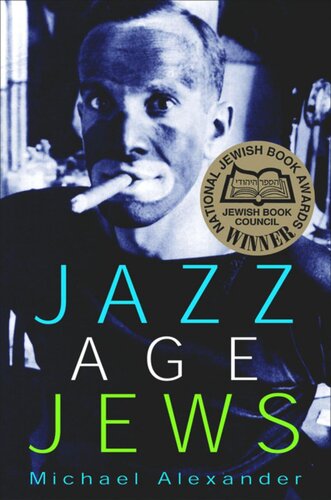

Most ebook files are in PDF format, so you can easily read them using various software such as Foxit Reader or directly on the Google Chrome browser.
Some ebook files are released by publishers in other formats such as .awz, .mobi, .epub, .fb2, etc. You may need to install specific software to read these formats on mobile/PC, such as Calibre.
Please read the tutorial at this link: https://ebookbell.com/faq
We offer FREE conversion to the popular formats you request; however, this may take some time. Therefore, right after payment, please email us, and we will try to provide the service as quickly as possible.
For some exceptional file formats or broken links (if any), please refrain from opening any disputes. Instead, email us first, and we will try to assist within a maximum of 6 hours.
EbookBell Team

4.7
26 reviewsBy the 1920s, Jews were--by all economic, political, and cultural measures of the day--making it in America. But as these children of immigrants took their places in American society, many deliberately identified with groups that remained excluded. Despite their success, Jews embraced resistance more than acculturation, preferring marginal status to assimilation.
The stories of Al Jolson, Felix Frankfurter, and Arnold Rothstein are told together to explore this paradox in the psychology of American Jewry. All three Jews were born in the 1880s, grew up around American Jewish ghettos, married gentile women, entered the middle class, and rose to national fame. All three also became heroes to the American Jewish community for their association with events that galvanized the country and defined the Jazz Age. Rothstein allegedly fixed the 1919 World Series--an accusation this book disputes. Frankfurter defended the Italian anarchists Sacco and Vanzetti. Jolson brought jazz music to Hollywood for the first talking film, The Jazz Singer, and regularly impersonated African Americans in blackface. Each of these men represented a version of the American outsider, and American Jews celebrated them for it.
Michael Alexander's gracefully written account profoundly complicates the history of immigrants in America. It challenges charges that anti-Semitism exclusively or even mostly explains Jews' feelings of marginality, while it calls for a general rethinking of positions that have assumed an immigrant quest for inclusion into the white American mainstream. Rather, Alexander argues that Jewish outsider status stemmed from the group identity Jews brought with them to this country in the form of the theology of exile. Jazz Age Jews shows that most Jews felt culturally obliged to mark themselves as different--and believed that doing so made them both better Jews and better Americans.